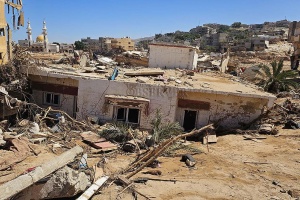By Youssef Lutfi, political writer
Losing stakes

As Libyans are awaiting the outcomes of the 6 + 6 committee- representing the House of Representatives (HoR) and the High Council of State (HCS)- which is tasked with formulating and laying down the rules for the upcoming electoral process, a debate has resurfaced again about the need to form a unified transitional government to lead the next stage.
Exigent consensus
Although, members of the 6 + 6 Committee declared "full consensus" on electoral laws, including those related to the election of the President of the State and members of the National Assembly, in addition to how to involve the political parties in the House of Representatives’ elections through party lists or individual candidacies, the circulating information indicates the deviation of 6+6 Committee from the course of negotiations on the electoral base to negotiating the formation of a mini-transitional government.
Irrespective of the committee’s transcending of its official mandate and discussing issues outside the scope of its tasks, consensus between HoR and HCS is a precedent, as we are not accustomed to any kind of consensus let alone full consensus, and in a record time!
Cross-cutting initiatives
The 6+6 committee’s rush to announce that it had reached a consensus that comes in light of a broader political context, as the dispute rages between the government on one hand and the HoR and the (HCS) on the other and between parties participating in the parallel negotiation tracks; such as Cairo talks between Saddam Haftar and leaders of armed groups in the western region, as well as talks between Belgacem Haftar with representatives of Abdel Hamid Dbeibah, ending with the talks of HoR and the HCS, where all these parties seek to reach an agreement that can reshape the political scene in a way that serves their survival and expansion at the expense of other components.
The dismissal of parallel government's prime minister, Fathi Bashagha, and his referral for investigation by Khalifa Haftar's bloc in parliament, and absence of Aqila Saleh during the voting session, indicates an exacerbation of the dispute between Saleh and Haftar, and also indicates the progress of the negotiation process with Dbeibah’s representatives, which explains Saleh's rapid agreement with Al-Mishri on the need to establish a mini-transitional government.
While the different negotiation tracks seem parallel at first glance, they necessarily clash in a number of files, rendering them conflicting paths, so the HCS and HoR reached an agreement that puts the ball in Dbeibah’s court, who vowed his government’s support and preparations for elections. On the other hand, the agreement of the armed groups in Tripoli with Saddam Haftar will undermine Dbeibah ‘s influence and put him under the pressure of these understandings, yet if Dbeibah is able to make progress in his negotiations with Haftar, this will give him the ability to maneuver and prolong his government in the foreseeable future.
Scene threads
The ongoing negotiation track between Belgacem Haftar and representatives of Dbeibah, which is an extension of the Dubai talks that resulted in the appointment of Bin Qadara at the helm of the National Oil Corporation, appears to be the strongest track, and appears to be the only track poised to produce a real understanding between its parties, in light of the dominance of Khalifa Haftar over Parliament and his control over the third path in Cairo, it seems that all roads lead to the first path.
On the other hand, the decision to form a mini-government that bypasses the Dbeibah government cannot be a purely internal decision. Just as the international parties played a key role in bringing Dbeibah list to power through the Geneva dialogue, overthrowing or bypassing this government requires a consensus between a number of effective international actors investing in the Libyan scene, led by Washington, which has been active both diplomatically and security wise, since the beginning of this year against the backdrop of Russian expansion and developments of the international scene, and Ankara, which has a military presence on the ground and strategic interests, and Cairo, which is rooted in the scene through the HoR and the army.
Conclusion
Using the calculations of Libyan national and popular interest, all bets of the current negotiation are losing stakes. The political and security actors in the scene are preoccupied with the protection of their personal gains and interests, as they are burdened with years of corruption, illegitimate gains, and distorted external connections. As for UNSMIL, it is engaged to a great extent in the agenda to impose a sham consensus no matter how such consensus seems distorted and unnatural. Furthermore, it is bound by Washington's security and diplomatic agenda to bring about relative stability, to which power-sharing understandings are the closest path.
Disclaimer: The views and opinions expressed in this article are those of the writer, and do not necessarily reflect those of the Libya Observer



